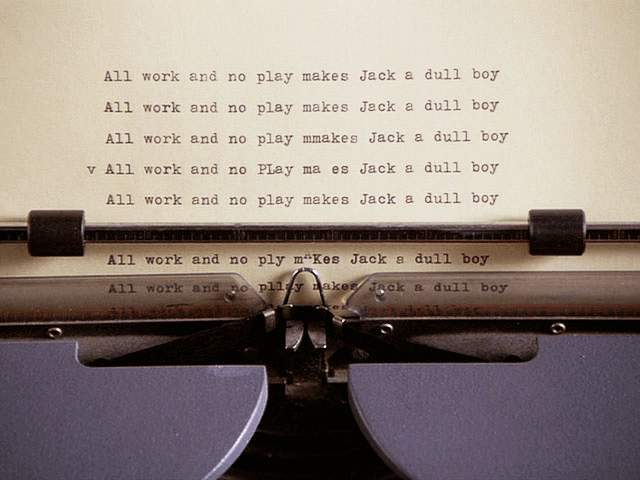The workday can be a daunting prospect if you don’t approach it correctly. Most people start their days with hopes of achieving benchmark levels of productivity, yet so many end up finding that they’re exhausted by 2 pm. Then, there’s the issue of simply not being able to focus enough throughout the day, regardless of how many energy drinks you pound. At times, it can seem as if increasing productivity at work is next to impossible.
The good news is that it’s not.
Being more productive at work starts with changing your current habits and trying something new. Many of these changes can also benefit other aspects of your life. With a little effort, you can streamline and improve your approach to the work week.
Looking to increase productivity at work? Here are 25 creative ways to revitalize your workday.
1. Recharge with sleep.
You’ve probably heard it time and time again: lack of sleep will disrupt your workday. Many people think that burning the candle at both ends is the best way to be productive, but after one or two days, burnout is sure to occur.
While everyone is different, most people need at least seven hours of sleep each night. If you wake up feeling refreshed, you’ll have a much better chance of increasing productivity at work.
2. Give yourself a wake-up period.
Many people make the mistake of rolling out of bed and immediately diving into work. This type of behavior doesn’t necessarily ensure productivity. Instead, you should give yourself time each morning to mentally prepare for the workday.
Checking email, making time for breakfast, and even reading the news are just a few ways to get the day moving. If you jump straight into a project without giving your body the chance to wake up, you could end up making costly mistakes.
3. Create a realistic task list.
Paying close attention to your weekly tasks is important, but don’t let yourself get overwhelmed. If you start the day off with a list of tasks that extends into the double digits, you may find yourself making initial progress — but is it really reasonable to assume you’ll get everything done?
If you miss the mark, you’ll start to feel discouraged, and you’ll lose momentum. Avoid this issue by keeping your task list to a minimum, and focus on the most important items first.
4. Prioritize each day.
It’s important to view each day of the workweek as a specific purpose or job. At the end of the day, you want to feel as if you’ve accomplished your tasks, and the only way to do this is to prioritize each day of the week. For example, on Thursday, you may want to set a goal of finishing a project you started at the beginning of the week.
Even if you have other tasks to complete, give yourself a clear and decisive goal to get the project done. This will make wrapping up the day all the more satisfying, while also increasing productivity for weeks to come.
5. Fading? Hit the gym!
Everyone has experienced what it’s like to fade out during the middle of the day. When you’re wilting on a regular basis, it’s time to make some changes. There’s no better way to increase your metabolism, increase productivity, and keep your brain firing on all cylinders than a quick midday workout.
If you’re lucky enough to have a gym within walking or driving distance, 20 minutes on an elliptical can be enough to kick-start yourself once again. If not, a simple walk around the block will help you wake up.
6. Cut back on caffeine.
Coffee helps the world turn, and it’s one of the true pleasures that can make your workday just a little bit easier. What many people forget though, is that too much caffeine can actually cause adverse reactions. Slam three coffees before going into work in the morning, and you’ll inevitably suffer a caffeine crash within a few hours.
Pacing yourself and moderating the amount of caffeinated drinks will not only help you avoid this common problem, but you’ll sleep better too.
7. Switch up your work environment.
If you have the luxury of working remotely, you’re already a step ahead of the game. Your work environment can have a huge impact on your mood and productivity, so every once in a while, it’s nice to switch things up. For example, some people prefer to work with a backdrop of ambient noise behind them — in which case, it might be a good idea to take your work to a coffee shop.
If mobile Internet is an option, there’s nothing better than working outside in the open air on a beautiful day. Even if you already love your current work environment, an occasional change will surely increase productivity at work.
8. Have a one-track mind.
Being able to multitask doesn’t mean you should always be doing it. People who are truly great at multitasking aren’t actually working on ten things at once — they’re dividing work into subsections and prioritizing one task over another. You should always give your full attention to one task at a time, as juggling a number of responsibilities will only cause confusion and headaches.
9. Clean It up.
A messy desk or office environment won’t do you any favors, no matter how productive you typically are. When you have piles of random papers falling off your desk and boxes stacked so high you can’t even see out the windows, you know you’ve got a problem.
Set aside some time for a cleaning session. You’ll be amazed how much easier it is to get things done when you’re working in a pleasant environment. Unsurprisingly, stress and messy work environments are linked to each other, and the best solution is to keep things clean and organized from the start.
10. Clear your head every hour.
There’s definitely something about getting into a groove with work. You can be on a roll for hours at a time, but even when this occurs, it’s important to step away and give your brain some time to rest.
Clearing your head for five or to ten minutes every hour will allow you to get back to your work with a fresh mindset. This is especially valuable when working on important projects. Get up, move around a little bit, and maybe strike up a conversation with a co-worker. The goal is to take your mind off of your work so that you can return with a sense of clarity.
11. Develop a routine.
A lot of people worry about settling into a routine, and this is an understandable concern. Nobody wants to become complacent, and routines are often confused with ruts, or a lack of forward progression. When it comes to work, however, this couldn’t be further from the truth.
Developing a routine will actually help you pinpoint effective methods and techniques to increase productivity at work. This happens naturally for most people, but if it doesn’t, it can be helpful to think about how a routine could benefit your work week.
12. Stay clear of “time-wasting” sites.
No matter how focused you think you are, just about everyone succumbs to visiting “time-wasting” sites now and then. This can be a great way to take a few moments away from the workday, but in many cases, it gets out of hand and becomes the workday.
No one actually wants to waste time watching random videos or perusing social media all day, but it can become habitual if you’re not careful. If you lack self-control, then fortunately, there are extensions available that allow you to block such sites. This is especially helpful when you’re working on a time-sensitive task or project.
13. Start the day with the most difficult tasks.
Do you find yourself dreading one or two challenging and time-consuming responsibilities each day? If so, you’re not alone. This is one of the most common issues in modern business, and frankly, it can be enough to cripple your work week.
Start the day by tackling the most difficult tasks on your to-do list, as this ensures that things get easier with each passing hour. If you leave complex responsibilities for the end of the workday, you might find it next to impossible to get things done accurately and professionally.
14. Create a work-life balance.
In an age where just about every professional has a smartphone in his or her pocket, it can be difficult to find time away from the office. There’s nothing wrong with handling a task or two outside of normal work hours, but if you’re not careful, you may find that work completely takes over your life. This is a recipe for disaster, as it can quickly end in burnout and put your career in jeopardy.
Social time and time for hobbies or relaxation need to make it into your day, regardless of how busy you are. Otherwise, your professional life will inevitably end up suffering.
15. Make the most of meetings.
Some people find themselves in a lot of meetings throughout the week, which isn’t ideal for a variety of reasons. Meetings are often unavoidable, and it’s usually better to learn how to best navigate them than it is to shy away altogether.
Your time is extremely valuable, which is why it’s important to prepare for each meeting with talking points and questions that you’d like to explore. Planning out a meeting will help you hit on everything important while also preserving time.
16. Focus on collaboration.
We live in an age where collaboration between two or more parties is easier and more realistic than in the past. Thanks to intranet software, people on other sides of the globe can work together on all kinds of projects, regardless of the time of day.
Collaboration between colleagues and coworkers can help increase productivity at work. When people come up with great ideas and bounce them off each other, benchmark solutions are created.
17. Improve communication standards.
As essential as collaboration tools are to today’s businesses, they cannot exist unless strong communication standards are in place. Employees must be able to contact each other quickly and effectively throughout the day, as any problems that arise can result in wasted time and lost productivity.
Whether you’re using old-school email for communication or working through social intranet software, streamlining this area of the work week is vital to you and your organization.
18. Pay more attention to output than hours.
The 40-hour workweek may be a social norm, but that doesn’t mean it’s a measure of productivity. Many people who are complacent in their jobs show up and work their 40 hours each week, yet how much are they actually getting done?
One way to increase productivity at work is to rethink your view of the workweek. It’s not about how many hours you work, but rather the amount that you actually get done. Productivity can be measured rather easily when you compare your actual versus intended accomplishments, and the hours involved may be far fewer (or at times greater) than expected.
19. Work hard, play hard.
What good is it to work yourself to the bone without celebrating your achievements? Sadly enough, this is an area where many people run into trouble, working long hours each day without giving themselves a moment to relax and reflect.
Socializing with colleagues after a job well done should never be discouraged. If you’re making moves in the professional world, allow yourself some fun outside the office.
20. Create long-term goals.
Increasing productivity at work stems from task lists and getting everything done before the end of the day, right? No, not always. This is a huge part of it, but you’ve got to take long-term goals into consideration as well.
Perhaps you’re looking to improve how you handle client meetings, or maybe you’re simply looking for a better system for organizing your professional life. These are issues that cannot necessarily be remedied overnight. Creating long-term goals like these will give you something to work towards that extends beyond the end of the workday.
21. Phone it in.
Digital communication has made life easier for everyone in the professional world, but to say you can’t survive without it would be missing a very important point.
Sometimes, waiting for an email to be returned can take all day or even longer. This delay clearly cuts into productivity at work, yet many people are averse to picking up the phone and would prefer to wait. If you’re apprehensive about calling a client or colleague, get over this fear as soon as possible. A phone call can save hours of waiting and keep your workday on track.
22. Improve your organizational skills.
Just about everyone needs to improve on some type of organizational tactic, whether it be in managing documents, time, or projects. When things are properly organized, all the time that might be spent trying to hunt something down is saved and can be devoted to other needs.
Improving your organizational principles can take some time, but the benefits are more than worth the added effort.
23. Write down creative “sparks.”
Every once in a while, something magical may pop into your head as you plug away at work. Creative “sparks” are to be treasured, as they can lead to ideas and solutions that can someday become benchmark products and services. These little gifts are forgotten because people don’t take the time to write them down.
If a good idea comes along, you don’t need to drop what you’re doing. Simply jotting it down gives you the opportunity to come back to it when you have some spare time.
24. Eat well at work.
Many people don’t realize how much of an impact food can have on increasing productivity at work. That sandwich shop around the corner may sound good, but before you know it, you might feel so full that you can’t get things done.
Eating light and snacking often at work can keep your metabolism rolling, so you won’t feel like you need a nap before the day ends.
25. Take time for reflection.
Perhaps the most important thing you can do to increase productivity at work is to reflect on each day or week. Focus on how things went. What do you feel you accomplished? Are there things you’d do differently next time? Answers to these questions can help you progress and move forward.
Written reflection is even more effective, as it gives you a frame of reference for the future. Regardless, don’t do yourself the disservice of going through each day on autopilot — reflect on your progress whenever possible.
In conclusion.
Increasing productivity will always be an ongoing mission, but the trick is to take things one at a time. Slowly incorporating each of the above tips into your work week can make a world of difference, and remember — if you have the drive to improve, you’re already halfway there.

















 info@axerosolutions.com
info@axerosolutions.com 1-855-AXERO-55
1-855-AXERO-55


